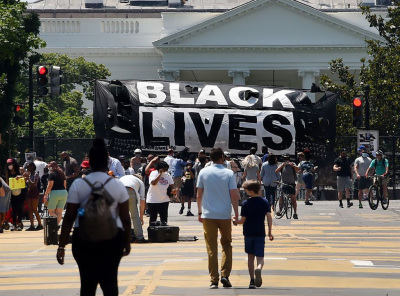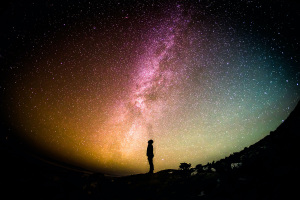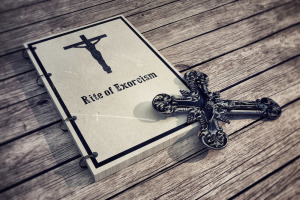Do Black Lives Matter?
Do black lives matter? On the one hand, the answer seems pretty obvious: of course, black lives matter. In recent weeks, we’ve witnessed protests, rioting, and violence all intended, we are told, to convince the nation, and even the world, of that fact.

But even though most Americans agree with the sentiment (while many disagree with the tactics), we are left with a real question: why do black lives matter? Something does not become true simply because one person, or even a mob, insists it is true. So, we must do some thinking.
If one begins with the assumption that matter is the primary reality and that humans exist merely as a product of natural selection and random mutation, then insisting on the moral significance of the accidental outcome of that process smacks of wishful thinking. If matter is all there is, then human lives have no moral significance. Thus, the idea of equality has no moral value; the notion of human rights is merely a bald assertion without justification; and justice is a human invention that, more likely than not, will benefit the strong and wealthy at the expense of the weak and the poor. In this scheme, black lives do not matter. Black lives cannot matter morally and neither do any other lives. Power is the fundamental component of all human relationships, and in such a world, the weak will always lose. The only open question — eventually settled by violence — is determining who is, in fact, weak and who is strong. Our country is careening recklessly in this direction.
But clearly the BLM protesters are making a moral claim, even if their tactics have at times descended into chaos and violence. This suggests a strange combination. They are making a strong and justifiable claim against the abuse of power by the police and voicing anger about elements of racial injustice that seem baked into the system. At the same time, the tactics of pure power suggests that the only real currency is force. In this strange scheme, power is wed to purity; Machiavelli to Christianity; Nietzschean will-to-power to Puritan moralism. This union, of course, is fundamentally incoherent: we are simultaneously hearing passionate calls for justice — real justice — but witnessing actions that suggest that power is all that matters. If power is all that matters, justice is an illusion, but if justice is a real category, power is not ultimate.
If we are going to build a credible and coherent case that black lives have moral significance, we will need to take another path. There is an obvious alternative: “In the beginning was the Word.” These familiar words from the Gospel of John indicate an alternative to the materialism that provides no justification for the moral significance of human life. The word translated as “Word” is “logos.” Logos can mean word, rational principle, or rational order. Thus, in the beginning was rational order. The Apostle continues: “the Word was with God, and the Word was God….Through Him all things were made.” John identifies this logos as Christ, who is both the personification of rational order and the maker of the universe. The creator has infused all of creation with a rationally intelligible moral order. Human beings participate in that order. Furthermore, we read in Genesis that God created human beings in His own image. Thus, humans possess inherent dignity because we are not simply the random products of a purely naturalistic process. In this scheme, all humans are morally equal because we are equally children of God. Here the concept of rights makes sense, and justice represents a real moral category calling forth real obligations. As moral beings we are obligated to seek justice, and given what we know about power, it is likely that we will need to protect the weakest among us: the poor and the helpless or, as one writer puts it, the widows and orphans.
One cannot make black lives matter by merely insisting that they do. One cannot will moral categories into existence. One cannot create moral value by protest, rioting, violence, or wishful thinking. If black lives matter only because of the force of protest or the threat of violence, then they don’t matter. Only power matters. However, black lives have long been the objects of abusive power. Turning the tables so that black people are now exercising power over others, though perhaps a temptation, is a fool’s game that jeopardizes any hope of a just solution to the abuse of power. It is playing the same old game by the same old rules: power trumps all. If power is the final arbiter of human affairs, then it will be abused, and life is reduced to nothing more than a struggle for domination. In this Hobbesian world of perpetual warfare, there is no prospect for peace or justice, much less reconciliation.
The alternatives are clear: reality is either fundamentally nothing more than brute matter or it participates in a divine order. If the former, no life matters. If the latter, humans possess inherent dignity regardless of race.
But I want to up the ante. The rhetoric and focus of Black Lives Matter effectively excludes all but those killed by rogue police — an injustice that must be addressed. However, the numbers clearly indicate this is not the only source of injustice and certainly not the most prevalent. The weekend before George Floyd was killed, six black men were murdered in Chicago. Do you know their names? They matter. On the day George Floyd was killed, Ledell Randel was shot in the head in a drive-by shooting in Chicago. He was black. His life mattered. Each day, on average 900 black babies are aborted. Their lives matter. So, too, the life of the lonely widow, abandoned and forgotten. And the life of the homeless person who in desperation has turned to drugs to blunt the despair. And those suffering from the internal chaos of mental illness. Yes, black lives matter. All Black Lives Matter.
Racism is repellant precisely because each human life is a beautiful reflection of the divine. If black lives matter (and they do), then all lives matter. Or to put things slightly differently: black lives matter precisely because all human life is precious. When we all begin living according to this profound truth, then and only then, will justice prevail.
Mark T. Mitchell is Dean of Academic Affairs at Patrick Henry College and author, most recently, of Power and Purity: The Unholy Marriage that Spawned America’s Social Justice Warriors.




























